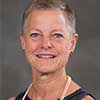How Will Women Affect the Future of Food?
PRESIDENT’S MESSAGE
Like many professions, food science and technology is being shaped by demographic changes as women increasingly play a more prominent role. We are highlighting several women as part of our FutureFood 2050 initiative. The FutureFood2050.com website is designed to promote a broader dialogue about science-based solutions to the challenges facing the global food system. In the latest content update, you’ll find interesting profiles of five professional women who aid in technical advancement of our complex food system.
Pamela Ronald, a Professor of plant pathology at the University of California, Davis, is a well-known proponent of genetically engineered crops, and she finds common ground with her husband, an organic farmer. They co-wrote the book Tomorrow’s Table: Organic Farming, Genetics and the Future of Food; they agree that using the best technology and the best farming practices is the way to achieve sustainable agriculture.
Isha Datar, Executive Director of New Harvest, a non-profit research organization, is working on alternative meat production and food sustainability. She promotes cultured meat because she says growing meat in a lab produces a product that is safer to eat, more humane to animals, and better for the environment.
Marie Wright, Vice President and Chief Global Flavorist at WILD Flavors, has created more than 1,000 flavors for food and beverage companies. She has a degree in chemistry and food science, and she believes flavor creation requires more artistry than science.
Michele Perchonok, Advanced Food Technology Project Manager at NASA, has played a pivotal role in building the menu for astronauts on the mission to Mars slated for the 2030s. Her work at NASA has been critical to operations in Houston.
Caroline Smith DeWaal, Director of Food Safety at the Center for Science in the Public Interest, is an expert on laws and regulations related to food safety. Her story focuses on efforts to track foodborne illness outbreaks and protect public health.
These five women, in very different areas of food science and technology, contribute their energy and expertise to lead the way in finding solutions to improve the global food system. I encourage you to read their remarkable stories, share their insights, and contribute your own thoughts at FutureFood2050.com.
According to the 2013 IFT Employment & Salary Survey Report, available on IFT.org, women comprise a slight majority of survey respondents for the first time. Those of us who have spent our entire careers in the food science and technology profession fully recognize the change in the workforce. The manner in which we experienced our education and professional lives is rather different from that of our young colleagues. We recently have been reminded by IFT’s survey that median salary continues to increase more for men than for women. Gender income discrepancy is, of course, much more far-reaching than within our industry. In 2013, according to the report, median starting salaries for women in food science were 89% of men’s, surpassing the wage gap’s national average. Our capabilities in food science and technology continue to drive the industry forward.
Our strong voice in the future of food is meaningful, and we can use it in ways that enhance the profession as well as the standing of women striving for individual successes at work. I have been fortunate to be able to keep driving to reach my professional goals. I have received advice and counsel from so many mentors over the years, and, of course, my family brings me right back to reality.
I ask that each of us consider again what our place is in the food science and technology world: how we can contribute and how we can grow. The opportunity is great, and it is always right in front of us.
We have some amazing women joining us at the 2014 IFT Annual Meeting & Food Expo® and speaking at our general sessions. Jane Karuku, President of Alliance for a Green Revolution in Africa, helped transform Telkom Kenya and manage operations for Cadbury in 14 countries across Africa. As a Beacon Lecturer, she will speak about the challenges and solutions regarding global food security.
Diane Ebert-May, Professor of plant biology at Michigan State University, is this year’s Fennema Lecturer. She will share her expertise and extensive research in student-centered learning.
Top food professionals from around the world are gathering in New Orleans, June 21–24, for IFT’s most important event of the year. In just four days, you’ll be inspired, informed, and energized. I hope to see you there!
 Janet E. Collins, Ph.D., R.D., CFS,
Janet E. Collins, Ph.D., R.D., CFS,
IFT President, 2013–14
DuPont Corporate Regulatory Affairs
[email protected]
